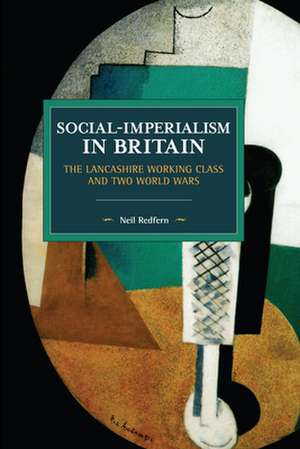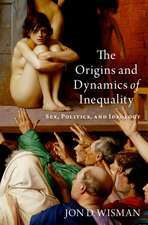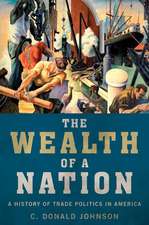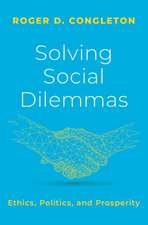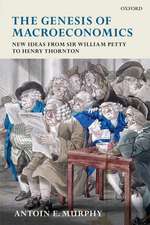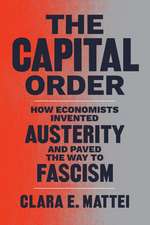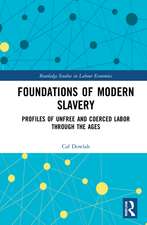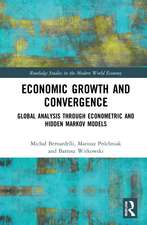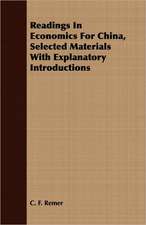Social-Imperialism in Britain: The Lancashire Working Class and Two World Wars: Historical Materialism
Autor Neil Redfernen Limba Engleză Paperback – 8 ian 2020
In Social-Imperialism in Britain Neil Redfern examines the relationship between British labour and British capital in the two world wars of the twentieth century. He argues that the Second World War, the so-called 'People's War, ' was an imperialist war no less than the First. He further argues that in both wars labour and capital entered into a social-imperialist contract in which labour would be rewarded for its support for war with such social and political reforms as votes for women and a health service, culminating in the 'welfare state' constructed after the Second World War. Concentrating on Lancashire, he examines the complex interaction between military successes and reverses, elite war aims, labour unrest and popular demands for reform.
Din seria Historical Materialism
-
 Preț: 329.45 lei
Preț: 329.45 lei - 11%
 Preț: 357.69 lei
Preț: 357.69 lei -
 Preț: 364.56 lei
Preț: 364.56 lei -
 Preț: 257.84 lei
Preț: 257.84 lei -
 Preț: 214.33 lei
Preț: 214.33 lei -
 Preț: 225.71 lei
Preț: 225.71 lei -
 Preț: 256.73 lei
Preț: 256.73 lei -
 Preț: 328.60 lei
Preț: 328.60 lei -
 Preț: 213.77 lei
Preț: 213.77 lei -
 Preț: 213.65 lei
Preț: 213.65 lei -
 Preț: 216.77 lei
Preț: 216.77 lei -
 Preț: 215.25 lei
Preț: 215.25 lei -
 Preț: 182.61 lei
Preț: 182.61 lei -
 Preț: 263.96 lei
Preț: 263.96 lei -
 Preț: 464.33 lei
Preț: 464.33 lei -
 Preț: 216.79 lei
Preț: 216.79 lei -
 Preț: 215.29 lei
Preț: 215.29 lei -
 Preț: 214.33 lei
Preț: 214.33 lei -
 Preț: 293.65 lei
Preț: 293.65 lei -
 Preț: 177.69 lei
Preț: 177.69 lei -
 Preț: 293.65 lei
Preț: 293.65 lei -
 Preț: 213.77 lei
Preț: 213.77 lei -
 Preț: 327.00 lei
Preț: 327.00 lei - 11%
 Preț: 390.05 lei
Preț: 390.05 lei -
 Preț: 215.12 lei
Preț: 215.12 lei -
 Preț: 472.05 lei
Preț: 472.05 lei -
 Preț: 215.12 lei
Preț: 215.12 lei - 11%
 Preț: 425.07 lei
Preț: 425.07 lei - 11%
 Preț: 421.92 lei
Preț: 421.92 lei -
 Preț: 258.37 lei
Preț: 258.37 lei -
 Preț: 351.49 lei
Preț: 351.49 lei -
 Preț: 511.89 lei
Preț: 511.89 lei -
 Preț: 292.89 lei
Preț: 292.89 lei -
 Preț: 216.24 lei
Preț: 216.24 lei -
 Preț: 257.18 lei
Preț: 257.18 lei -
 Preț: 256.89 lei
Preț: 256.89 lei -
 Preț: 178.73 lei
Preț: 178.73 lei -
 Preț: 315.36 lei
Preț: 315.36 lei -
 Preț: 214.03 lei
Preț: 214.03 lei -
 Preț: 180.75 lei
Preț: 180.75 lei - 11%
 Preț: 427.25 lei
Preț: 427.25 lei -
 Preț: 214.03 lei
Preț: 214.03 lei -
 Preț: 257.89 lei
Preț: 257.89 lei -
 Preț: 147.76 lei
Preț: 147.76 lei -
 Preț: 186.78 lei
Preț: 186.78 lei -
 Preț: 466.28 lei
Preț: 466.28 lei -
 Preț: 186.78 lei
Preț: 186.78 lei -
 Preț: 313.55 lei
Preț: 313.55 lei -
 Preț: 465.31 lei
Preț: 465.31 lei -
 Preț: 227.62 lei
Preț: 227.62 lei
Preț: 226.67 lei
Nou
43.39€ • 47.14$ • 36.47£
Carte tipărită la comandă
Livrare economică 21 aprilie-05 mai
Specificații
ISBN-10: 1642590495
Pagini: 268
Dimensiuni: 152 x 229 mm
Greutate: 0.39 kg
Editura: Haymarket Books
Seria Historical Materialism
Notă biografică
Neil Redfern, Ph.D. (Manchester, 1998), is now retired. He has taught history at Manchester University and Manchester Metropolitan University. He has published a monograph Class or Nation Communists, Imperialism and Two World Wars (I.B. Tauris, 2005) and many articles on the communist movement.
Cuprins
Table of Contents
Acknowledgements
Introduction
1 Rallying Round the Flag
1 The Labour Movement and the War
2 Mustering the Masses for War
3 The End of the Road for Liberalism?
4 The Discontents and Demands of the Labour Movement
5 &'Dilution' and the Mobilisation of Women
2 Labour's Unrest and Capital's Promises
1 Conscriptions and &'Conchies'
2 Social Patriots and (a few) Internationalists
3 Labour Unrest and (eventual) Government Response
4 Strikes, Shop Stewards and Revolutionaries
5 A Better World Coming?
6 More Strikes, More Shop Stewards and Some Revolutionaries
3 1919: A &'Red Year'?
1 A Revolutionary Situation in Britain?
2 Expanding the Franchise: Suffragettes, Suffragists and the Labour Party
3 Labourists, Feminists and Socialists: Labour's New Platform
4 The Labour Movement in the General Election of 1918
5 1919: A Tumultuous but not &'Red Year' in Lancashire
6 Housing Reform and the Municipal Elections of 1919
7 The Post-War Crisis, the Working Class, and the Empire
4 Rallying Round the Flag Again
1 An Imperialist War in Anti-Fascist Clothing
2 The Crisis of 1940
3 Building a Labour-Capital Pact
4 Never Again! The Early Growth of Popular Reform Sentiment
5 Dissent and Discontent in the Working Class and in the Labour Movement
6 Joint Production Committees: A &'Nazi System of Labour Organisation'?
7 Out of the Kitchen Again: Mobilising Women to &'do their bit'
8 Not Counting the Colonies: The Labour Movement and the Empire
9 A Social-Imperialist Surge for Reform
5 Building the Social-Imperialist Settlement
1 Beveridge Promises a New World
2 The &'Old Gang' Takes an Ideological and Political Beating
3 A Resurgence of Industrial Unrest
4 A Touch on the Reform Accelerator
5 More Promises, More Unrest, More Discontent
6 Social Imperialism Triumphant: The Last Phase of the War
7 Labour to Power: The End of the War and the General Election
Conclusion and Postscript
Bibliography
Index
